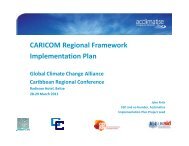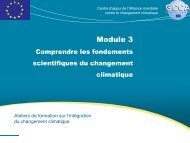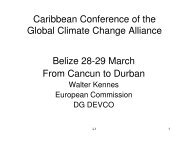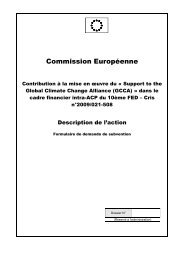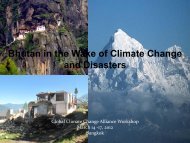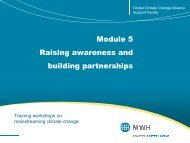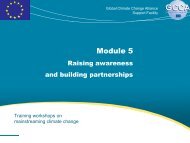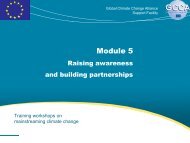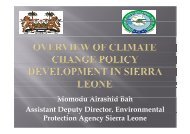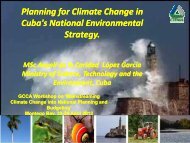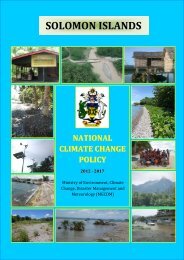Rwanda Green Growth Strategy 18nov11 - Global Climate Change ...
Rwanda Green Growth Strategy 18nov11 - Global Climate Change ...
Rwanda Green Growth Strategy 18nov11 - Global Climate Change ...
Create successful ePaper yourself
Turn your PDF publications into a flip-book with our unique Google optimized e-Paper software.
Detailed Programmes of ActionProgramme 5: Low Carbon Energy Mix Powering the National GridResponsible Stakeholders (lead in bold)MININFRA, EWSA, RURA, Private SectorSummary of Programmes and ActionsIncreasing the supply, access and stability of electricity in <strong>Rwanda</strong> is essential for achieving the MillenniumDevelopment Goals and maintaining economic growth. <strong>Rwanda</strong> will implement a programme for sustainablepower generation for the national grid based around four implementable actions: a strategy to phase outfossil fuels, incentivising private sector investment in renewable electricity, renewable energy norms andcodes of practice, and a long-term strategy to phase out peat. Action 1: <strong>Strategy</strong> for Oil-Fuelled Generation Phase Out<strong>Rwanda</strong> will make the most out of its domestic renewable energy potential in order to reduce reliance onimports. Diesel generation of electricity for the national grid will be phased out as soon as possible.Geothermal development will be a national priority, and the level of generation from methane to power willalso increase. Total volume of hydropower electricity generation will increase, whilst its overall share of thegeneration mix will decrease relative to geothermal and methane in order to reduce vulnerability tohydrological risks. <strong>Rwanda</strong>’s peat resource will be utilised as a stopgap measure if delays occur in thedevelopment of other resources, and to quickly reduce the share of diesel generation in the energy mix.Regional connections will be developed so that electricity can be both exported and imported whererequired. Energy efficiency will also be an integral part of the strategy. Policies will be implemented toefficient electrical products, and in the area of power transmission, efficiency will be improved by applying adistributed power structure to the electricity grid to minimise losses by providing power in proximity to itsuse. Action 2: Incentivise Private Investment in Renewable Electricity<strong>Rwanda</strong> will provide feed-in tariffs and long-term power purchase agreements (PPAs) to provide a secureinvestment environment for independent power producers (IPPs) by guaranteeing long-term procurement ofthe energy produced at a fixed-rate. A law will be passed stating that once the grid is expanded to includean area with private electricity producers, the utility will either purchase the technology outright, or it willbegin procuring the electricity via the feed-in tariff. This law will remove the danger facing IPPs that gridextension could undermine their business. International funding will be sought to supplement the feed-intariff rate while risk financing will be sought and employed to underwrite PPAs. Secure affordable financingfor IPPs could be set higher for renewable electricity. Action 3: Renewable Energy Norms and Codes of PracticeMost renewable energy technologies in <strong>Rwanda</strong> are in relatively early stages of development, and normsand codes of practice still need to be developed. <strong>Rwanda</strong> will implement safety guidelines, rules forcompensation of those potentially affected by a project, rules for private sector involvement, maintenancestrategies and productive end uses. Implementing these regulations will remove uncertainty for privatesector investors and project developers. This initiative could be supported by a Centre of Excellence inEnergy Research. Action 4: <strong>Strategy</strong> for Peat Phase OutPeat is a domestic, cheap and easily exploited source of energy. <strong>Rwanda</strong> will utilise peat to make up thesupply if delays occur in the development of other resources, and to quickly reduce the share of dieselgeneration in the energy mix. However, there are a number of issues with the use of peat for energyincluding potential conflict with other land uses, its finite supply, and its negative environmental impacts.<strong>Rwanda</strong> will exploit other domestic sources of energy to avoid developing a dependence on peat, and onceother sources of energy have been sufficiently developed peat will be phased out.64Government of <strong>Rwanda</strong>



